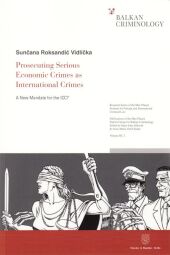 Neuerscheinungen 2018Stand: 2020-02-01 |
Schnellsuche
ISBN/Stichwort/Autor
|
Herderstraße 10
10625 Berlin
Tel.: 030 315 714 16
Fax 030 315 714 14
info@buchspektrum.de |

Suncana Roksandic Vidlicka
Prosecuting Serious Economic Crimes as International Crimes.
A New Mandate for the ICC?. Dissertationsschrift
2018. XVIII, 529 S. XVIII, 529 S. 224 mm
Verlag/Jahr: DUNCKER & HUMBLOT 2018
ISBN: 3-428-15199-2 (3428151992)
Neue ISBN: 978-3-428-15199-8 (9783428151998)
Preis und Lieferzeit: Bitte klicken
Serious economic crimes committed in a period of political and economic transition, have often been neglected in criminal proceedings. The Balkan region is no exception. The study connects international criminal law with discourses of international human rights law, security studies, (supranational) criminology, political sciences, transitional justice and (economic) criminal law in order to find arguments as to why it is necessary to start prosecuting serious economic offences as crimes under international law and why they should find their place in the ICC Statute.
Serious economic crimes and violations of economic, social and cultural rights have often been neglected in criminal proceedings and reports of truth commissions that have followed in the wake of economic transitions or conflicts. Although such economic crimes often result in a substantial loss of wealth to the overall economy and society of the country in question, they have not been widely nor effectively prosecuted. The Balkan region is no exception to this rule.
The study connects international criminal law with discourses of international human rights law, security studies, (supranational) criminology, political sciences, transitional justice and (economic) criminal law in order to find arguments as to why it is necessary to start prosecuting serious (transitional) economic offences as crimes under international law and why they should find their place in the ICC Statute. The research explains why Art. 7(1)(k) of the ICC Statute is the most plausible means to do so without violating the principle of legality.
"A very valuable scientific work on a highly innovative topic. [It] offers a new theoretic frame in which international economic crimes committed as crimes of the powerful by private corporate economic actors can be related to mechanisms to prevent and punish impunity, such as the ICC." Prof. Dr. John A.E. Vervaele, Utrecht Law School, President of AIDP
"A serious and thought-provoking study. The topic is of great importance. I could not agree more with the conclusion that the time has come to consider some of the most serious, systematic and widespread economic crimes, breaching economic, social and cultural rights, as crimes under international law." Prof. Dr. Ksenija Turkovic, Judge, European Court of Human Rights, Strasbourg
"A very courageous and intelligent piece of work." Prof. Dr. Dr. h.c. Walter Perron, Albert Ludwigs University, Freiburg i.Br.
Suncana Roksandic Vidlicka was a doctorate candidate of the Criminology Department at Max Planck Institute of Foreign and International Criminal Law, writing her dissertation as Cotutelle de thèse between the University of Zagreb´s Faculty of Law and Freiburg University´s Faculty of Law. She teaches at the Zagreb Faculty of Law and is a member of the Max Planck Partner Group for Balkan Criminology. She is the Head of the Croatian Unit for the International Network of the UNESCO Chair in Bioethics and a member of the UNODC Anti-Corruption Academic Initiative. In 2017 she was a (co-)rapporteur for AIDP. She is the head of the Jean Monnet Project Advanced Seminar in EU Criminal Law and Policy. In 2011 she received the Annual Award for the best young scientist in social sciences by the Society of University Professors and other Scientists of the University of Zagreb. She has published in English, Croatian and German on issues which concern breaching and strengthening international human rights, primarily economic and social ones, by mechanisms of national and international criminal law.


